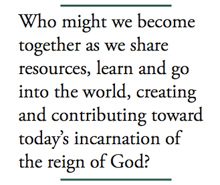Stephen Kriss, PPC
skriss@mosaicmennonites.org
 New York Times writer, Thomas Friedman is fascinated by the concept of freeware in his book on global economics and movement, The World is Flat. Freeware is a genre of computer software and applications lodged on the web, developed and tweaked by designers and programmers from around the world. Skilled techies who speak different languages find ways to collaborate, create and largely hold themselves accountable through a community of integrity for development and advancement of projects and initiatives. They innovate and contribute often for nothing more than the exhilaration of developing something that is good and useful, motivated by the opportunity to work together in a community with other tech savvy persons connected by shared questions, goals and possibilities.
New York Times writer, Thomas Friedman is fascinated by the concept of freeware in his book on global economics and movement, The World is Flat. Freeware is a genre of computer software and applications lodged on the web, developed and tweaked by designers and programmers from around the world. Skilled techies who speak different languages find ways to collaborate, create and largely hold themselves accountable through a community of integrity for development and advancement of projects and initiatives. They innovate and contribute often for nothing more than the exhilaration of developing something that is good and useful, motivated by the opportunity to work together in a community with other tech savvy persons connected by shared questions, goals and possibilities.
Franconia Conference was created to confer, to gather, to test doctrine and direction, to discern the moves of the Spirit, to maintain what John Ruth of the Salford congregation has called “the right fellowship.” We’ve been gathering now across four centuries, maintaining and at times extending that right fellowship to persons across the Perkiomen Creek and the Delaware River, north of Route 80 and increasingly south of the Pennsylvania Turnpike, south of the Rio Grande and into the world.
 Contemporary theologians and theorists suggest that Mennonites have a unique perspective with an emphasis on orthopraxy (right practice/action) rather than orthodoxy (right belief/thought). In this issue of Intersections, how we’re practicing the faith together as a community becomes evident. These activities—sharing resources and learning between congregations, opening spaces for persons with differing abilities, considering the situation of immigrants, responding to needs in northern Pennsylvania—manifest some of the best of our efforts at mutuality, mission and extending grace.
Contemporary theologians and theorists suggest that Mennonites have a unique perspective with an emphasis on orthopraxy (right practice/action) rather than orthodoxy (right belief/thought). In this issue of Intersections, how we’re practicing the faith together as a community becomes evident. These activities—sharing resources and learning between congregations, opening spaces for persons with differing abilities, considering the situation of immigrants, responding to needs in northern Pennsylvania—manifest some of the best of our efforts at mutuality, mission and extending grace.
We gather together to meet and confer, for sure. And often in thinking of the conference, we think of committees, organizational structures and decision-making processes. The conference is designed to “maintain our fellowship” in many ways. But in these pages, I see glimpses of ways that we are moving toward “extending the fellowship”: in sending and receiving with communities in Chile and the United Kingdom, in supporting emerging leaders through the Area Conference Leadership Fund and in considering the ways that the Bible reads us and is read by us.
New Testament Bible scholar Laura Brenneman who teaches at Bluffton University, recently visited with Methacton congregation, Christopher Dock Mennonite High School and with emerging leaders at the Germantown Historic Mennonite Meetinghouse. In her discussion at Germantown, we considered the possibilities and responsibilities of freedom in Christ, freedom from fear and movement toward life. It’s a freedom that pulls us toward cultivating responses that extend peaceableness into the world.
I can’t help but think that as we embrace that freedom in this age of connectivity and movement that Friedman describes, that we’ll find ourselves with new possibilities to move to extend and explore our historic right fellowship.
Who might we become together as we share resources, learn and go into the world, creating and contributing toward today’s incarnation of the reign of God? Maybe we’ll find ourselves contributing and problem-solving because it’s exhilarating and life-giving, because we, like God, are creative in our relating and freedom. We might yet be transformed and joyous in our connecting through open and available possibilities that embody and extend the prophet Micah’s call to justice, mercy and grace.
The opinions expressed in articles posted on Mosaic’s website are those of the author and may not reflect the official policy of Mosaic Conference. Mosaic is a large conference, crossing ethnicities, geographies, generations, theologies, and politics. Each person can only speak for themselves; no one can represent “the conference.” May God give us the grace to hear what the Spirit is speaking to us through people with whom we disagree and the humility and courage to love one another even when those disagreements can’t be bridged.
